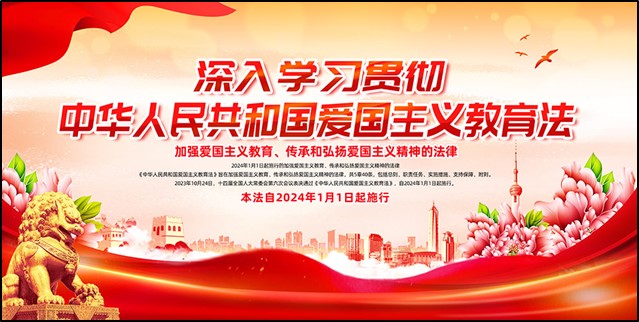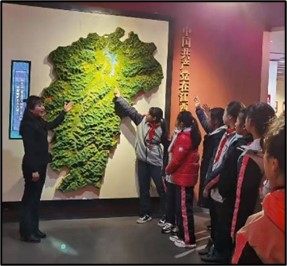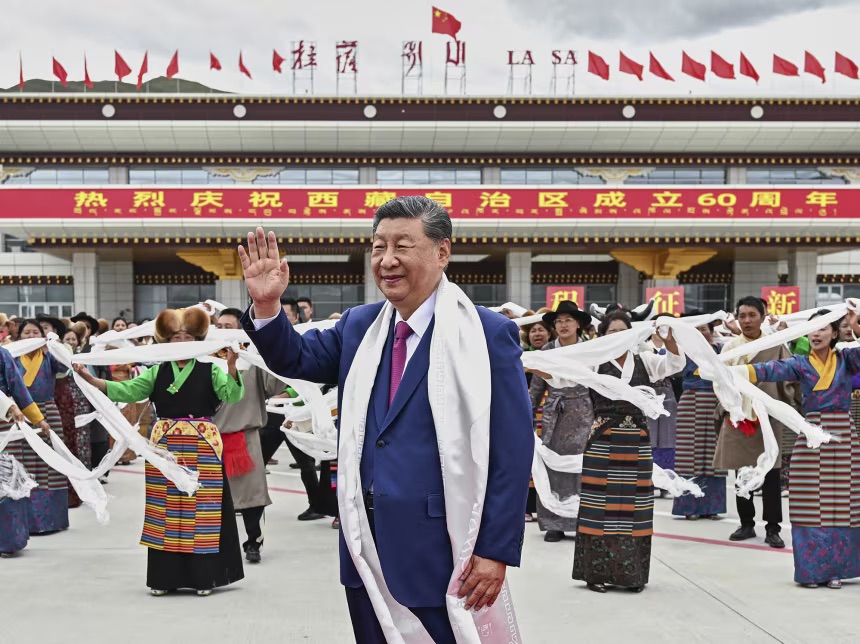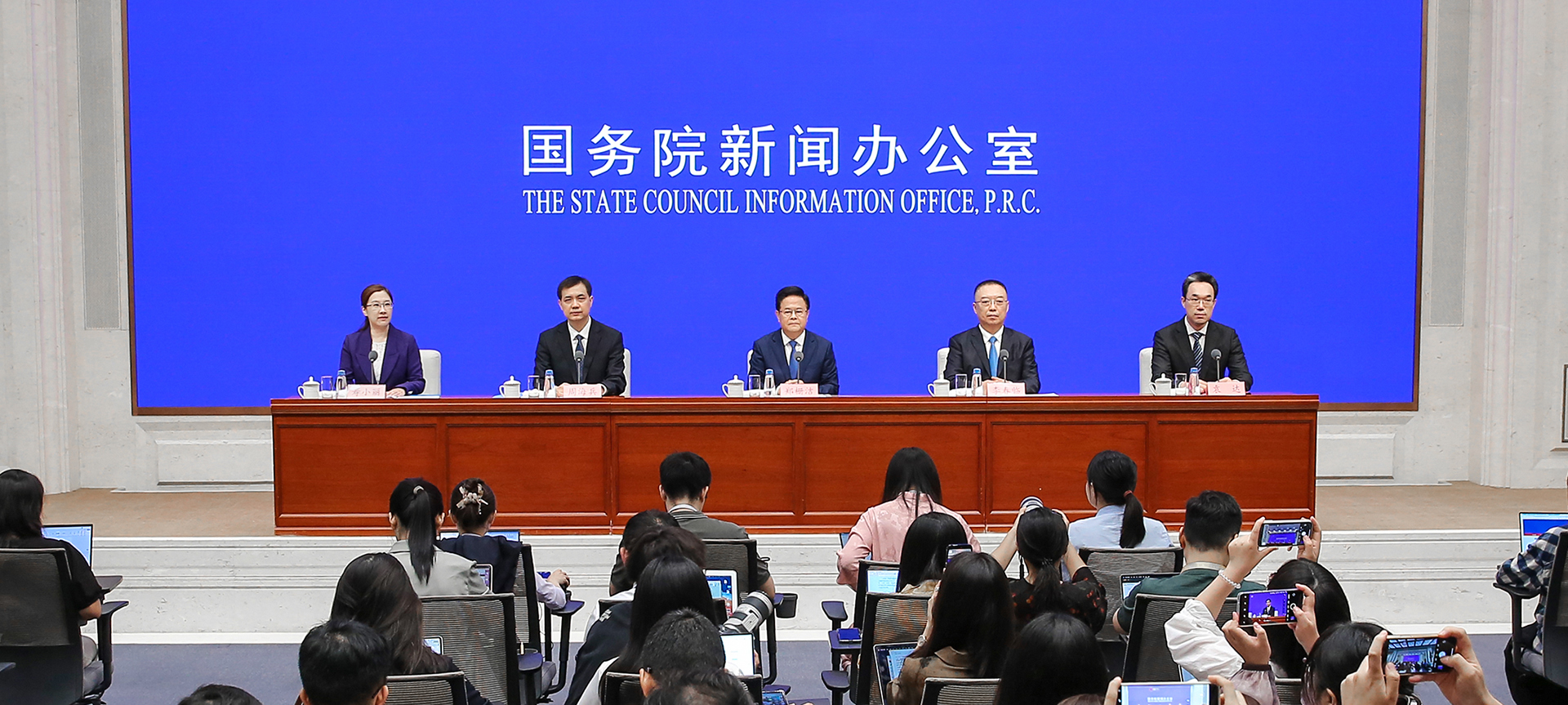
CCP Ideological Indoctrination, Part 1: The PRC’s New “Patriotic Education Law”
CCP Ideological Indoctrination, Part 1: The PRC’s New “Patriotic Education Law”
Author’s note: This is the first article in a two-part series focused on recent initiatives taken by the Chinese Communist Party to implement ideological indoctrination programs intended to reinforce the Party’s ruling position, as well as the current official ideology of “Xi Jinping Thought.” This first article deals with a new law intended to promote “patriotic education” among the general public. The follow-up article will analyze a revised CCP plan revealed in autumn 2023 for the ideological training of Party officials.
On October 24, the People’s Republic of China (PRC) National People’s Congress (NPC) Standing Committee (全国人民代表大会常务委) officially codified the country’s existing initiatives for “patriotic education (PE; 爱国主义教育)” by promulgating the People’s Republic of China Patriotic Education Law (中华人民共和国爱国主义教育法). This mandates indoctrination in state-directed ideological content throughout all sectors of society (PRC Government, October 25). While CCP policy documents are always more important than formal PRC law, the Party-state does use formal laws passed by the National People’s Congress (全国人民代表大会) to codify and emphasize Party policies. This law appears to be no exception. [1]
The unveiling of the new Patriotic Education Law has been accompanied by a campaign of predictably laudatory coverage in PRC state media. For example, the CCP mouthpiece People’s Daily ran a flowery editorial that quoted a professor from the China University of Political Science and Law as stating that “implementing the patriotic education law will enhance the daily practice of patriotic spirit” among the Chinese people. The editorial itself opined that the NPC had, “on the basis of the rule of law, promoted and guaranteed New Era patriotic education, inspiring the nation’s spirit, concentrating the people’s strength, advancing the building of a strong country [and] national revival with extremely significant and profound meaning” (People’s Daily, November 23). Such coverage has appeared alongside other official messaging emphasizing the need for enhanced focus on ideological instruction. For example, the mid-October issue of the CCP’s official journal Qiushi (求实) was a themed issue focused on ideology. It featured a lead article under Xi’s name titled “Open New Frontiers for the Sinicization and Modernization of Marxism.” It also included a list of articles on supporting themes, such as a Central Party School article titled “In the New Era and New Journey, Unceasingly Advance the Party’s Innovations in Theory” (Qiushi, October 16).
It is to be expected that the CCP propaganda apparatus would hype legislation such as the Patriotic Education Law as a significant achievement—and calls for ideological rectification have been a regular feature of CCP discourse under Xi Jinping. However, there is reason to believe that the new law is significant as part of a broader effort by the CCP to reinforce longstanding efforts to propagate its preferred ideological narratives throughout Chinese society and to shore up public loyalty to the one-party state.
What Is “Patriotic Education” in the PRC?
While intensive ideological indoctrination is woven throughout CCP history, the Party’s current framework of policies took shape in November 2019, when the CCP unveiled two lengthy framework documents on the subject of ideological “education.” The first of these was a detailed program from the CCP Central Committee that laid out a range of measures to increase the time and attention that CCP cadres would be required to spend on ideological study (China Brief, December 31, 2019). [2] The second of the two 2019 initiatives was a document from the CCP Central Committee and the PRC State Council on measures directed towards the general public, titled Implementation Guidelines for Patriotic Education in the New Era (新时代爱国主义教育实施纲要) (China Brief, December 10, 2019).
“Patriotic education” has a long history in the PRC. Such programs—also presented under the parallel rubric of promoting “socialist spiritual civilization (社会主义精神文明)” (Dangjianwang, October 13)—were expanded in the 1990s in the wake of the Tiananmen crisis, as the CCP sought to harness patriotic narratives as a tool for rebuilding its own damaged legitimacy. [3] The focus of these efforts always incorporated material related to national concepts of patriotism (e.g., China’s history, traditional culture, etc.) in tandem with an emphasis on political loyalty to the CCP—with the greatest emphasis falling on the latter. The 2019 plan emphasized this still further, mandating a significant increase in the resources and attention dedicated to ideological indoctrination in “Xi Jinping Thought on Socialism with Chinese Characteristics in the New Era (习近平新时代中国特色社会主义思想).” The plan placed a particular focus on youth in schools, in order that young people might “inherit red genes (传承红色基因)” of loyalty to the Party. However, it also mandated efforts across society, to be implemented through regional CCP Party committees as well as the “people’s groups and mass organizations (人民团体和群众组织)” controlled by the CCP United Front Work Department (China Brief, December 10, 2019).

The October 2023 Patriotic Education Law does not change the direction of earlier ideological indoctrination policies, but it does further reinforce and strengthen them. A central message of the law is that while certain groups—such as students—may receive particular attention, measures for “patriotic education” are to be directed at the whole of Chinese society. Much of the text is vague and exhortational in nature, laying out broad guidelines to follow rather than specific requirements. That said, the text is valuable for highlighting and revealing the CCP’s policy priorities, as well as the extent of its totalitarian ambitions that PE measures be “merged into daily [life] (融入日常)” for all citizens (Article 5). [4]
Some of the major themes and provisions contained in the law are listed below.
Loyalty to the Party as the Most Essential Element of Patriotism
The clearest message contained in the law is that the fundamental element of “patriotism” consists of absolute loyalty to the ruling CCP. In an early section of the document that identifies the “fundamental content of patriotic education (爱国主义教育的主要内容),” the first three entries cover: the evolution of Communist ideology under the CCP; the history of the CCP and the history of “New China” under the CCP; and “the system of socialism with Chinese characteristics [and] the major achievements of the Chinese Communist Party in leading the people in united struggle.” Only after this, in fourth position, comes “China’s outstanding traditional culture”—linked together, of course, with China’s “revolutionary culture [and] socialist advanced culture” (Article 6).
Similarly, the text links patriotism inextricably with Communist ideology—and posits “Xi Jinping Thought” as the rightful evolution of the Party’s historical hierarchy of ideological formulations. The text states that:
Patriotic education must raise high the banner of socialism with Chinese characteristics, persist in taking Marxism-Leninism, Mao Zedong Thought, Deng Xiaoping Theory, the important thinking of the “Three Represents,” [and] the Scientific Development Concept, with Xi Jinping Thought on Socialism with Chinese Characteristics in the New Era as a guide; [and of] persisting in loving the country, loving the Party, and loving socialism integrated together…” (Article 3).
In addition to PE study materials, the law also emphasizes “red tourism (红色旅游)”—that is, visits to sites associated with Party history or the Party’s accomplishments—as an important element of PE programs. The text states that “People’s governments at county level and above should strengthen the safeguards, management, and uses for red resource [areas], unearth red resources with historical value [and] memorial significance, promote red tourism fused with developing model zones, bring into play the educational functions of red resources, and pass on the patriotic spirit ” (Article 25).
Patriotic Education Must Be Emphasized In Schools…
As might be expected, children are to be a priority group for ideological indoctrination. The text states that PE must be “channeled into the compulsory education system (纳入国民教育体系),” and that it must “run through the entire course of school education (贯穿学校教育全过程).” (This echoes directives from the earlier 2019 Guidelines that PE content should not stand alone, but rather be merged into the full scope of school curricula.) Schools are also charged to emphasize PE in school activities outside of the classroom, to include organized visits to “patriotic education bases (爱国主义教育基)” such as museum exhibits and historical sites connected to CCP history (Article 16). Nor are such activities to end upon leaving campus: “The parents or other guardians of minors should merge passionate love of the country into household education” that follows the end of the school day (Article 17).
…But Implemented Throughout All Of Society
However, one should not make the mistake of thinking that PE is only to be directed at students. Rather, it is also to be directed at adults in the workforce. Using Maoist language evocative of earlier decades of the PRC, the law asserts that “enterprise work units should include patriotic education in the unit’s education program, vigorously enhancing model worker spirit…” (Article 19). A primary role in organizing such efforts will be held by Party agencies—particularly the United Front Work Department—that oversee state-controlled labor and professional organizations. The law states:
Labor unions, the Communist Youth League, the Women’s Federation, industry and commerce associations, literary and arts associations, writers’ associations, science and technology associations, the China Federation of Returned Overseas Chinese, the Taiwan Compatriots Friendship Association, disabled persons associations, youth federations, and other mass organizations [should] develop patriotic education geared to their respective fields (Article 13).
As with students and young people, these PE efforts in state-controlled “mass organizations (群团组织)” should be incorporated into all facets of the groups’ activities:
Grassroots people’s government organizations and grassroots autonomous mass organizations should merge patriotic education with activities for constructing socialist spiritual civilization (把爱国主义教育融入社会主义精神文明建设活动), reflect patriotic spirit in town conventions and village regulations, encourage and support the development of patriotism as the central theme of mass culture, sports, and other such activities (Article 20).
Measures for Implementation
Despite the range of measures laid out in the document, the text of the law is somewhat vague regarding the implementation of these programs, as well as which Party-state entities bear responsibility for particular functions. It states that “central department(s) for patriotic education (中央爱国主义教育主管部门)” will be responsible for national-level guidance and supervision (Article 11); and that regional offices of this department (地方爱国主义教育主管部门) will be responsible for “patriotic education work guidance, supervision, and comprehensive planning and coordination” at the local level (Articles 12 and 24). [5] The text also describes a role for state education departments, stating that “people’s government education administration departments above the county level are to strengthen the organization, coordination, guidance, and supervision of patriotic education in schools ( ” (Article 12).
Conclusions
On its face, the October 2023 Patriotic Education Law appears to offer little that is substantively new. Its provisions are largely consistent with the CCP’s previous 2019 Guidelines for “patriotic education,” as well as the broader trend towards intensified ideological regimentation observable throughout Xi Jinping’s tenure in power. However, the law does further emphasize the Party’s focus on these initiatives. Many outside observers are too quick to dismiss the central role that ideology plays in the functions of the CCP Party-state, and therefore fail to understand the Party’s policy-making orientation, and the institutional worldview of its leadership. The fact that the CCP saw fit to symbolically codify these “patriotic education” measures into law—and to promote them with a concurrent state media campaign—once again reinforces the high-level importance that the current CCP leadership places on society-wide ideological indoctrination as a key pillar of the Party’s survival in power.
The forthcoming second article in this series will offer a detailed analysis of the CCP’s October 2023 four-year plan for the ideological “education” of CCP cadres.
Notes
[1] Prominent examples of this in recent years include the 2005 Anti-Secession Law (反分裂國家法) (PRC State Council Taiwan Affairs Office, April 13, 2022); and the 2015 National Security Law (国家安全法) (PRC Government, July 1, 2015).
[2] The successor document to this program, a revised October 2023 plan for cadre ideological training, will be discussed in the next article in this series.
[3] Suisheng Zhao, “A State-Led Nationalism: The Patriotic Education Campaign in Post-Tiananmen China,” Communist and Post-Communist Studies (1998), 31 (3): pp. 287–302.
[4] All cited quotations in this section are from the text of the People’s Republic of China Patriotic Education Law (中华人民共和国爱国主义教育法), as promulgated by the National People’s Congress Standing Committee (October 25), https://www.gov.cn/yaowen/liebiao/202310/content_6911481.htm. All translations are by the author.
[5] It is ambiguous as to whether “central department[s] for patriotic education” refers to a singular bureaucratic entity, or whether it is employed as a more general term for the collective effort of multiple party bureaucracies (系统) with overlapping responsibilities for ideological indoctrination (CCP Propaganda Department, CCP Organization Department, et al). Per the 2019 Guidelines document, management of patriotic education programs was to operate under “the unified leadership of party committees, with party and state exercising joint management; propaganda departments will plan and coordinate; relevant departments will each be responsible for their work patterns, establishing patriotic education joint conference systems [for] work guidance and communication coordination.” (See: John Dotson, “The CCP’s Renewed Focus on Ideological Indoctrination, Part 1: The 2019 Guidelines for ‘Patriotic Education’,” China Brief, Vol. 19, Issue: 21 (December 10, 2019), http://jamestown.org/program/the-ccps-renewed-focus-on-ideological-indoctrination-part-1-the-2019-guidelines-for-patriotic-education/.) It is possible that a more specialized, centralized bureaucracy for patriotic education programs may have superseded the arrangements described in 2019. However, this is speculative, and further research to clarify these points would be required.


